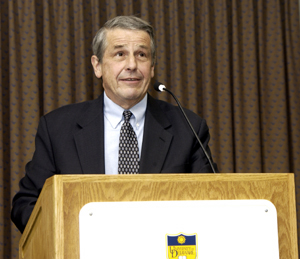|
5:30 p.m., April 11, 2003--“Institutions of higher education must be both places apart and places engaged,” Donald W. Harward, president emeritus of Bates College, told those gathered for the University Forum on Thursday, April 10, in the Perkins Student Center. “Engagement in our communities is inherent in our very mission to educate.”
 |
| Donald W. Harward: “Service-based learning is not volunteerism or good works.” |
Harward formerly served as chair of UD’s Department of Philosophy and was founding director of what is now the University Honors Program. A frequent contributor and consultant to professional discussions regarding institutional planning, research and liberal education, service learning and presidential and board leadership, Harward addressed the forum in conjunction with the announcement of UD’s new Academic Council on Service-Based Learning.
“Many students come to our campuses feeling alienated from the world and their own communities,” Harward said. “Our job…is to foster both the critical judgment and patterns of challenge that are required for education, and to broker the conditions that support students and amplify their voices as they engage in serving and learning.”
Harward emphasized that “service-based learning is not volunteerism or good works” because students are directly involved in applying what they learn to help solve problems in their communities. He cited several examples of service-based learning to illustrate his point.
- Math students who took on the task of designing the most efficient trash collection routes for their city.
- History students whose research helped inventory documents relating to their city’s history.
- Sociology students who systematically surveyed residents of a low-income area to identify the community’s most pressing social service and housing needs.
At its best, service-based learning blurs the distinction between applied research and civic engagement, Harward said, because “knowing is linked to action.”
Harward, who received his doctorate in philosophy from the University of Maryland, served as president of Bates College from 1989-2002, when he was appointed president emeritus. Before taking office at Bates, he served as vice president for academic affairs at the College of Wooster in Ohio.
A senior adviser for the American Council on Education Fellows Program and a senior fellow with the Association of American Colleges and Universities (AAC&U), Harward serves as a consultant for the joint AAC&U and Campus Compact project to establish a national Center for Liberal Education and Civic Engagement.
Photos by Kathy Flickinger
|

